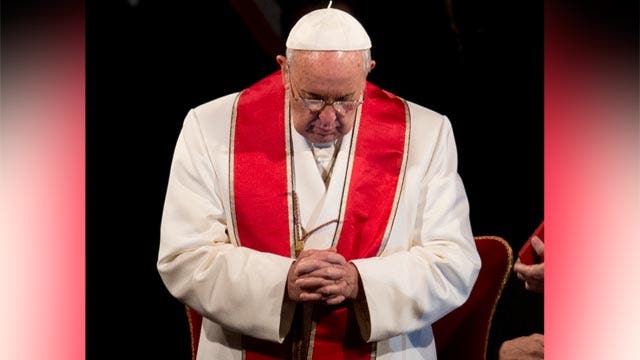Pope Francis condemns terror attack at university in Kenya
Religious persecution of Christians mounting?
At the Vatican in Rome, Pope Francis listened during Good Friday services as a papal preacher decried how the world is ignoring the growing persecution of Christians.
"Christians are of course not the only victims of homicidal violence in the world, but we cannot ignore that in many countries they are the most frequently targeted victims,” said Preacher of the Pontifical Household Raniero Cantalamessa, a day after the murder of 147 university students, most of them Christian, in eastern Kenya at the hands of Islamist gunmen.
"We risk, all of us, the institutions and the people of the Western world, to be Pontius Pilate who wash their hands of (these events)," he added.
Earlier the Pope sent a telegram of solidarity to the victims of the terror attack at Kenya's Garissa University in which he said, “His Holiness condemns this act of senseless brutality and prays for a change of heart among its perpetrators.”
Four Islamist gunmen separated Christian students from Muslims, freeing those who said they followed Islam, and executing the Christians on the spot. In Nairobi Friday, Kenyans attended Good Friday services, where there was outrage and sadness about the attack.
"As a Christian…I would like to challenge the Muslim community, even if it will be to call a conference and distance themselves from what is happening because it is a bit unfortunate that all terrorists are Muslims and I believe not all Muslims are terrorists," Haron Muratha, a Nairobi resident, told the Associated Press.
More than 80 percent of Kenyans are Christian.
Like the 270 Nigerian school girls kidnapped by Boko Haram a year ago, these students were targeted for their religion.
“One of the ultimate goals of jihadists, Al Qaeda, ISIS and others is basically to create, to produce a civilization of war between an Islamic world that they would control and what they consider as a Christian, Judeo-Christian West,” said Walid Phares, a Fox News Channel Middle East and terrorism expert.
The Kenya attack was just the latest in a recent string of attacks on Christians around the world.
More than 140,000 Christians have been forced to leave their homes in Iraq since ISIS infiltrated the country in 2014.
An estimated 500,000 Christians have fled their homes in Syria for surrounding countries.
Other high profile attacks against Christians prior to the attack in Kenya include:
• March 19, 2015: Islamic State militants used explosives to destroy the 4th Century Mar Benham monastery in Bakhdida, 20 miles south east of Mosul. The ancient building was built by Assyrian king Senchareb 1,600 years ago.
• March 15, 2015: Taliban suicide bombers detonated bombs in two churches in Lahore, Pakistan killing 14 people.
• February 2015: Human rights groups reported ISIS militants kidnapped an estimated 250 to 300 people from a string of villages along the Khabur River. The residents there are mostly Assyrian, an indigenous Christian people. More than 1,300 Christian families fled their homes.
• February, 15 2015: ISIS releases an online video showing the gruesome beheading of 21 Egyptian Coptic Christians killed on the shores of Tripoli.
• July 25, 2014: ISIS declared Mosul to be free of Christians.
• July 2014: Letters from ISIS are distributed to Christian leaders in Iraq's second largest city. On the way out of Mosul, the final 1500 families of Mosul's Christian population were reportedly robbed at ISIS checkpoints.
• July 2014: ISIS destroys the tomb of Jonah, a prophet in the Bible’s Old Testament believed to be swallowed by a whale or fish. Islam recognizes Jonah as well.
• June 2014: ISIS seized the buildings of the Chaldean Catholic archdiocese and the Assyrian Orthodox diocese in Mosul -- ISIS took down or destroyed six religious and cultural monuments in the city, including a statue of the Virgin Mary.
• June 2014: Mosul sacked by the Islamic State. The city’s roughly 80,000 Christians flee. Since 2003, two-thirds of Iraq's 1.5 million Christians have emigrated.
After being criticized for not mentioning the religion of the Egyptian Coptic Christians executed in Libya in February, the White House included the Kenyan university students’ faith in a statement Thursday.
“We extend our deep condolences to the families and loved ones of all those killed in this heinous attack, which reportedly included the targeting of Christian students,” the statement said.













































